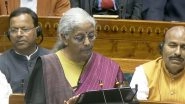California, August 9: A new study has found that the perception of effective leaders may depend on the type of emotions they choose to express, and people use implicit theories of leadership emotions when evaluating a leader's effectiveness. The findings of the study were published in the 'Journal of Organizational Behavior'.
Women leaders must often battle sexist stereotypes that label them "too emotional" for effective leadership. The study shows that when they express calm, happy emotions, however, women are perceived as more effective leaders than men. The effect is most pronounced for leaders in top positions in an organization. Also Read | Cristiano Ronaldo Reacts After 0-3 Loss Against Barcelona in the Joan Gamper Trophy 2021, Says 'Keep Working'.
The study, conducted by psychology professor Thomas Sy at UC Riverside and management professor Daan van Knippenberg at Drexel University, is the first to examine prototypes for the types of emotions displayed by leaders and concluded that people use implicit theories of leadership emotions when evaluating leader effectiveness. Also Read | Bangladesh vs Australia 5th T20I 2021 Live Streaming Online On FanCode: Get BAN vs AUS Cricket Match Free TV Channel and Live Telecast Details On Gazi TV.
Cognitive leadership prototypes, known as implicit theories of leadership, have been well-studied. Research consistently finds that effective leaders are seen as intelligent, dynamic, and charismatic, among other qualities. Men are also thought to be seen as possessing more of these qualities than women.
It is commonly understood that some types of emotional expression can diminish perceptions of leader effectiveness. Sy, an organizational psychologist who studies leadership, wondered if people also have implicit emotional prototypes, or schemas, that influence how they react to leaders. With van Knippenberg, he designed a series of studies that asked respondents to describe what types of emotions leaders feel and express.
The results revealed six emotional schemas associated with leadership. Three of them -- cheer, calm, pride -- were associated with effective leadership. The other three -- anger, fear, remorse -- were associated with ineffective leadership.
"Every role has emotions that must be expressed, including leaders. To be effective, leaders must perform emotional labour," Sy said. "What was surprising in our research is that women were rated more effective, and this could be explained by implicit theories of leadership emotions," Sy added.
Although men have more leeway for expressing negative emotions, Sy and van Knippenberg found that when women don't express negative emotions they are seen as more effective than men.
Implicit theories of leadership emotions had the most impact on perceptions of leadership effectiveness for leaders at the highest levels of management. Moreover, the expression of negative emotions did not undermine the effectiveness of top leaders to the same extent they did for low-ranking leaders. Low-ranking leaders, both men and women, were penalized for expressing anger.
"When we interact with a leader regularly, such as our immediate boss or supervisor, we have enough firsthand information to evaluate their effectiveness," Sy said.
"But we usually have little contact with leaders at the highest levels and less information about them. Therefore we tend to rely on schemas. Schemas are powerful. Even in the absence of data, they shape our behaviour," Sy explained.
Implicit theories of leadership emotions influence perceptions of effectiveness, with positive schemas associated with positive outcomes and negative schemas associated with negative outcomes.
"Past research shows the emotions of a leader affect the performance of followers. The leader's emotions are contagious, spread throughout the team, and affect the effectiveness of the whole group," Sy concluded.
The findings should help leaders manage their emotions to maximize effectiveness, improve the performance and satisfaction of team members, and provide a roadmap for future leadership researchers.
(The above story is verified and authored by ANI staff, ANI is South Asia's leading multimedia news agency with over 100 bureaus in India, South Asia and across the globe. ANI brings the latest news on Politics and Current Affairs in India & around the World, Sports, Health, Fitness, Entertainment, & News. The views appearing in the above post do not reflect the opinions of LatestLY)













 Quickly
Quickly


